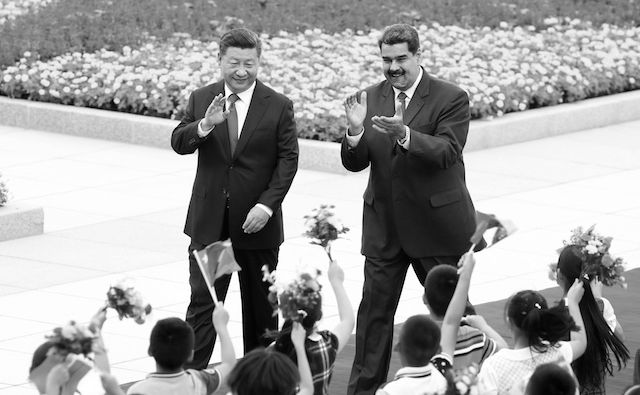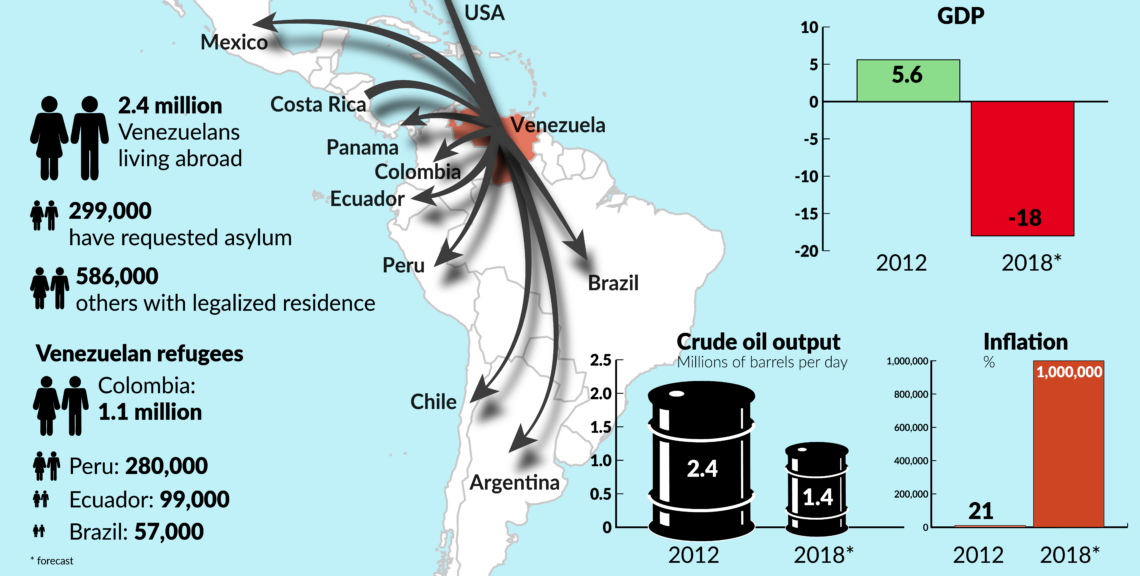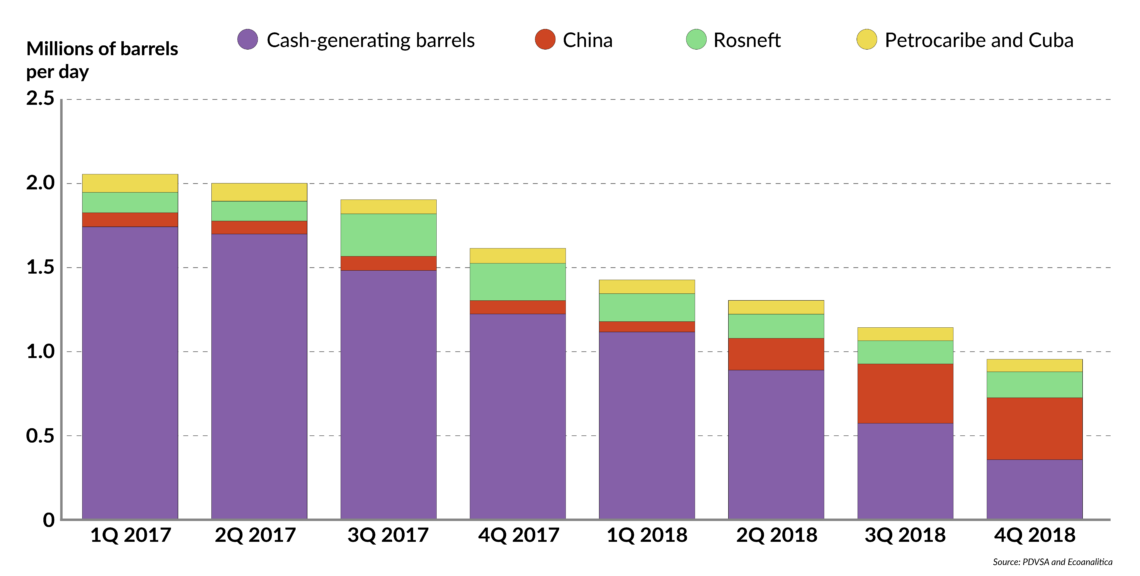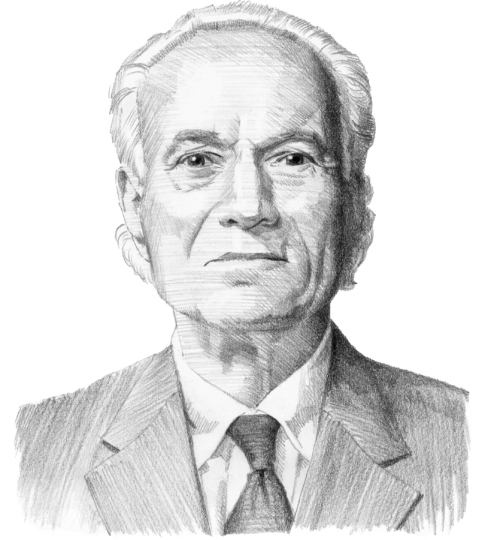The ‘military option’ in Venezuela is an illusion
China is considering helping the Venezuelan regime meet its most pressing domestic needs and start rebuilding the oil industry. The USA, meanwhile, is hinting that it could use force to remove the brutal regime. Collective pressure on Caracas from the Latin American community, remains the only realistic way of resolving the crisis.

In a nutshell
- China reportedly promised to make $5 billion available to the sinking Venezuelan regime for its most pressing needs
- The mismanaged country is going through a humanitarian crisis of staggering proportions
- The Latin American community is best positioned to apply pressure on the regime to help avert the looming tragedy
Can it be that United States President Donald Trump has prompted the Chinese to step into the mess in Venezuela to help President Nicolas Maduro remain in power – with a simple threat of U.S. military intervention in that country?
Perhaps it was Florida’s Republican Senator Marco Rubio who first mentioned the “military option” for dealing with Venezuela, not Mr. Trump. The president, though, did make such a suggestion in one of his early morning tweets and repeated it in his speech at the United Nations. Whoever or whatever precipitated the move, China’s President Xi Jinping told the press that his country would do all it could to help Venezuela as he greeted Mr. Maduro and his wife in Beijing on September 14, 2018.
Chinese money
The Chinese leader took the time to criticize President Trump for his “unfair” attacks on the government of Venezuela. Shortly after that, rumors circulated in the international financial press that the Chinese government would make $5 billion available to the Maduro regime to enable it to meet its most immediate needs. That has not been confirmed, but if China delivered at least a chunk of such a sum, it would go a considerable way toward keeping Mr. Maduro and his friends in power well into 2019.
The significance of the Chinese offer cannot be overstated. It marks the first time China has inserted itself into such a hot debate in the hemisphere and could have broad geopolitical consequences.
Information coming out of Venezuela is fragmentary. Still, it is clear that the country is going through a humanitarian crisis of staggering proportions. The International Monetary Fund predicts that inflation will reach 1 million percent by the end of the year. To deal with this, the government recently devalued the currency by 95 percent. UN sources indicate that more than 80 percent of the population is suffering from hunger or malnutrition. Power outages occur daily in Caracas. In the interior, where the infrastructure is less well maintained than in the capital, outages have been reported to last for days. In the face of all of this, the Venezuelan government has steadfastly denied there is a crisis and refused repeated offers from the EU and others of aid in food and medicine.
Facts & figures
Venezuela: migration follows economic collapse

The most notorious evidence of the catastrophe is the increasing wave of people leaving Venezuela. More than two million of its citizens have sought refuge in countries throughout South America. The UN and the Organization of American States, which have created special commissions to monitor the disaster, both predict that the number will reach 3 million by the end of 2018. If this process were to continue, by the end of 2019 Venezuela will surpass the crisis in Syria as the generator of the world’s biggest flood of refugees.
Responses from the region
It is the refugee crisis that offers the one glimmer of hope for a multilateral, peaceful resolution of the crisis. The initial effort to induce a transition in the government in Venezuela through international mediation between it and the political opposition collapsed at the end of 2017. The next attempt, called the Lima Group, brought 14 countries from the region together to attempt to persuade the Maduro regime to end its repression and allow the political opposition to operate freely and contest it in legitimate elections. That effort appears to have run out of energy.
Now, with the refugee crisis threatening to overwhelm the governments of Colombia, Ecuador and Peru, these countries, together with Brazil and others in South America, have arranged a meeting in Quito to attempt some coordination in dealing with the crisis. This significant initiative has been undermined by the U.S. president’s mention of the military option.
No one in Latin America wants to see the United States intervene militarily in the affairs of any country in the region, no matter how egregious, authoritarian or corrupt that government might be.
The Venezuelan regime has taken advantage of the chaos in the country by tightening its control over scarce supplies.
The migration crisis may prove sufficiently disruptive in enough countries to push them to some form of collective coercive pressure on the Maduro government. On the other hand, the fast-growing Venezuelan community in the U.S. is increasingly vocal in its demand for military action against the man they consider a dictator. Their tone became even more strident after videos appeared on the Miami Herald website showing Mr. Maduro and his wife dining in a luxury restaurant in Istanbul on their way home from Beijing.
The governments of Ecuador and Peru have declared that they will not accept Venezuelans without passports. The new government in Colombia, led by Ivan Duque, has threatened to close the border with Venezuela, although subsequently, President Duque said Colombia never would close its borders. The governments also indicated their willingness to consider the military option. Mr. Maduro’s response was to offer to take back Venezuelans who feel “abused” by the countries to which they have fled and to threaten Bogota with a military response to any attempt to close the border.
Cynical maneuvers
The Venezuelan regime has taken advantage of the chaos in the country by tightening its control over scarce supplies of food and medicine through the use of the Patriot Card (“Carnet de la Patria”) without which people cannot gain access to distribution centers. Moreover, those in the military who now control those distribution networks are using the cards to enrich themselves through their privileged access to cheap dollars on the (also carefully watched) exchange market.
The political opposition remains fragmented and leaderless, making it easier for the Maduro team to stay on top. Civil society finds it difficult to express anger over the government’s incompetence or protest its corruption and failure to provide its citizens with basic necessities. Moreover, in the absence of a coherent political alternative to the Maduro government or international consensus on what ought to be done, any discussion of “the military option” will lack an exit strategy. With whom or with what would an invading military force replace Mr. Maduro?
The Chinese offer of aid comes at an opportune moment for the Venezuelan government. With the collapse of petroleum production, it was slowly starving itself of resources. Worse, it was being squeezed by two lawsuits brought in United States courts by a gold mining and exploration company, Crystallex, and a multinational energy corporation, ConocoPhillips. Both had won the court’s permission to seize Venezuelan assets in place of overdue payments (in mediated settlements for the expropriation of their properties in Venezuela). The companies’ legal teams had begun with the seizure of government-owned tankers in berths outside of Venezuela and would have shut down Venezuelan oil exports in a matter of months.
Facts & figures
Composition of exported barrels

Now, the Venezuelan government has promised to begin payments to both companies on fixed schedules, although no payments have been made as of this writing. It also declared that it had begun talks with international oil-servicing companies on acquiring their help in maintaining the deteriorating infrastructure of PDVSA, the state-owned oil and natural gas company. Again, no such agreements have been negotiated. Recently, Venezuela signed a deal with a state-controlled Chinese petroleum company to take 49 percent of a project in the Orinoco basin, which would provide the technical expertise necessary to make the project successful. With no new money from China before the end of the year, these efforts will come to naught and Venezuela will probably default on its bonds and the settlement payments it has promised.
Even so, in the absence of international will and consensus, and without a coherent opposition, military intervention in Venezuela would be useless for the lack of a feasible exit strategy. Furthermore, with the Trump administration hinting at a military option and increasing the number of government members on the list of those sanctioned, the collective will of the Latin American community to apply pressure on the Maduro regime has all but evaporated. In this context, it can last a very long time, especially with a tranche of money from China.








